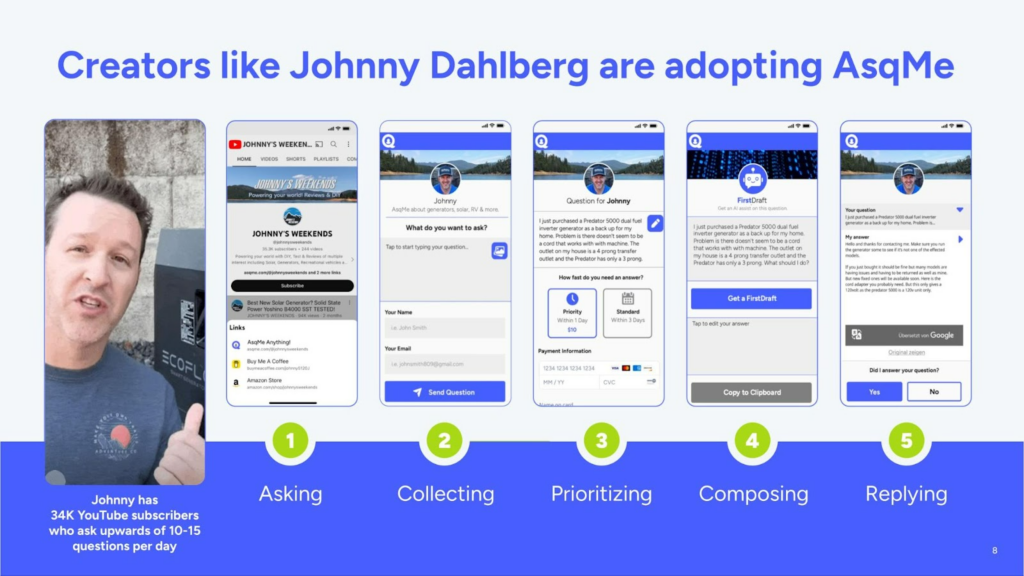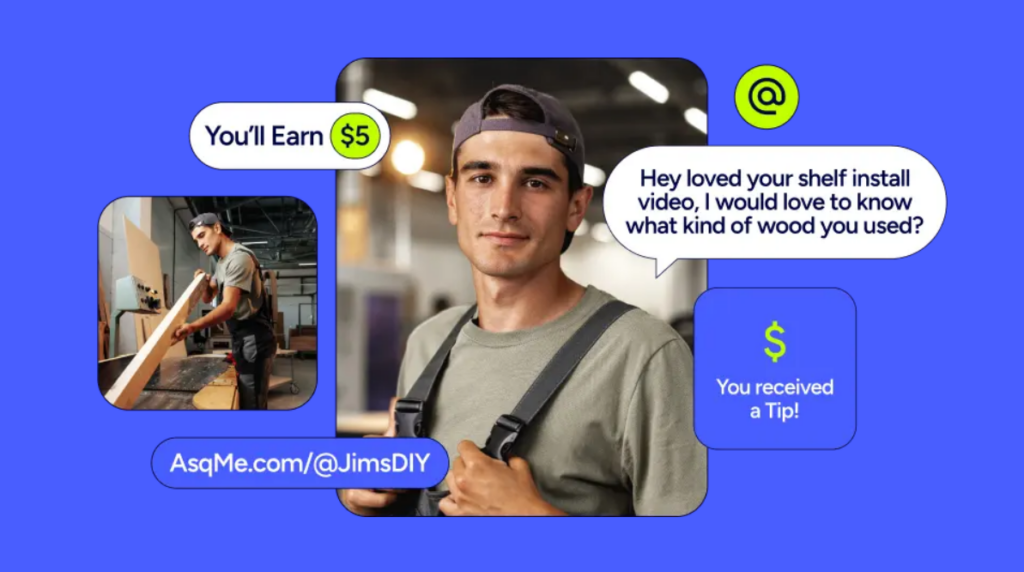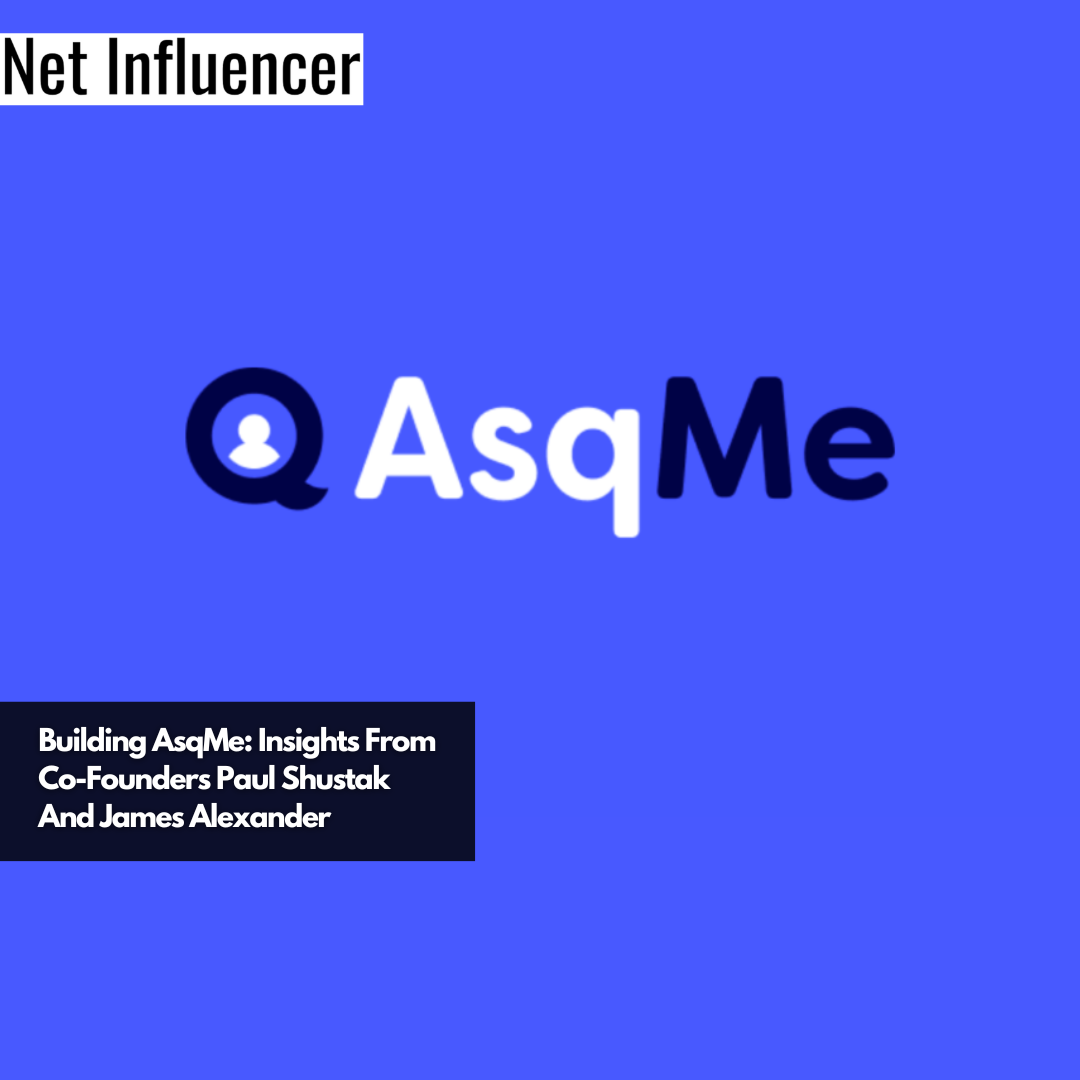Technology
Building AsqMe: Insights From Co-Founders Paul Shustak And James Alexander

AsqMe, a startup launched in January 2023 by veteran tech entrepreneurs Paul Shustak and James Alexander, aims to transform how creators interact with their audiences. Sparked by the lack of effective channels for audiences to engage creators beyond limited commenting features, AsqMe provides a “universal inbox” to funnel audience questions into one platform.
Central to AsqMe’s model is enabling creators to monetize audience questions through pay-per-answer fees or a tip jar feature. This not only incentivizes creators by allowing them to capitalize on their expertise, but also enhances audience engagement. AsqMe streamlines creators’ workflows by automatically translating questions, identifying repetitive queries, and directly emailing creators new questions.
AsqMe co-founders Paul Shustak and James Alexander first crossed professional paths at Adobe, where they collaborated on launching Adobe Stock Photos. “James and I have similar backgrounds. We both worked at big tech companies,” said Shustak, whose post-Adobe path has included both startups and consulting engagements, imbuing him with a wide range of entrepreneurial experience. “I’ve done five startups and had a couple of exits,” he stated.
Alexander’s journey has mirrored that of Shustak’s. “We met back in 2004 at Adobe. Like Paul, I’ve had stints at both large corporations and startups,” explained Alexander, noting that while their joint professional background is steeped heavily in tech and business, an underlying connection to assisting content creators has persisted throughout. In addition to Adobe, Alexander worked at IBM and Apple. “Our work, like at Adobe, was about helping creators,” he said.
The genesis of AsqMe originated from a straightforward yet prevalent issue. “About a year ago, Paul called me,” recounted Alexander. “He had this problem – trying to contact a creator from a YouTube video but couldn’t.” This moment of annoyance catalyzed their conceptualization of AsqMe.
Alexander also relayed a personal anecdote that further inspired AsqMe’s creation: “I had an issue with my elliptical. A YouTube video saved me easily 100 bucks on repairs. I would have gladly tipped the creator, but there was no way to do that.” This story spotlights a vital pillar of AsqMe’s raison d’être: enabling creators to derive income from aspects of their work that were previously unmonetizable.

AsqMe co-founders James Alexander and Paul Shustak
AsqMe: Revolutionizing Creator-Audience Interaction
“In January 2023, we started talking about AsqMe. I was skeptical that no one had done this before,” Paul says. He highlights a fundamental issue: the lack of effective channels for audiences to ask questions of creators beyond the limited scope of comment sections. “The problem is, if you want more information from a creator, there’s really no way to do it except to put your question in the comments.”
“AsqMe is basically a universal inbox for questions. Creators are on multiple platforms and get questions on all of them. That means a lot of work to track all those questions and get them into one single place”, James explains. “AsqMe, is the stopgap. We are that funnel to take all those questions and bring them into one single place where the creator can answer them, and we apply tools to make that flow easier.”
The innovation of AsqMe lies in providing incentives for creators. “You can monetize the questions you get,” Paul shares. This model offers a clear path for audiences to ask questions, and for creators, it opens doors to not just monetize but to engage more deeply with their audience.

But AsqMe’s vision extends beyond monetization. Paul elaborates, “As we talked to more creators, we realized there’s more opportunity to help them drive engagement, upsell services or products, and create content from the questions they get.”
James highlights a crucial insight: perceiving audience questions as a chore. “Ask any creator about questions they get every week, and you’ll see it’s a chore,” James notes. He points out two major pain points: repetitive questions and questions about content already covered in their videos. “We can identify repeat questions and automate responses,” he explains. This not only reduces the repetitive nature of addressing audience queries but also leverages technology to direct audience members back to relevant content, enhancing engagement and refreshing older content.
“With the right tools, getting a question should be embraced,” James asserts. AsqMe provides these tools, changing the narrative from struggle to opportunity.
AsqMe’s Mission: Empowering Creators
“Our first mission is helping creators be successful by monetizing,” James asserts. But it’s not just about money. AsqMe also aims to give creators the gift of time. “If creators can answer twice as many questions in half the time, they can engage more and create more content,” he explains.
James emphasizes that AsqMe’s mission is also about enhancing efficiency and productivity, this is crucial in setting AsqMe apart in a space where other platforms fall short. “Our competition isn’t another platform; it’s the fragmented process creators currently use,” he explains. Most existing solutions are platform-specific, leading to a scattered and inefficient workflow for creators who typically engage with multiple platforms. AsqMe’s mission is to provide a service that consolidates these disparate elements.

“We’ve built a single workflow that addresses the major pain points creators face,” James says. This approach includes features like a universal inbox that channels questions from all platforms, automatic translation of questions in foreign languages, and direct emailing of questions to creators.
AsqMe’s Monetization and Engagement Innovations
AsqMe is designed to give creators control over how they monetize their expertise. As James explains, “There’s pay-per-answer, where a creator sets a price for their expertise. Then there’s the Tip Jar for those who don’t want to charge but are open to tips. And finally, some creators prefer not to charge at all”, James explains. This flexibility allows creators to align monetization with their personal brand and audience relationships.
The user experience is designed to keep the creator’s brand front and center. James elaborates, “When you ask a question through AsqMe, it feels like you’re directly interacting with the creator’s platform. We don’t want to create a barrier between the creator and their audience”
AsqMe also allows audience members to attach files to their questions, a feature absent in many other platforms. This capability is beneficial for detailed queries or when visual context is needed.
Paul goes on to discuss the platform’s Auto-Translate feature. He addresses the significant trend of content translation for global distribution. “Content is increasingly being translated into foreign languages,” he states, highlighting two main reasons: the economic opportunity for creators to reach wider audiences and the ease of translation due to generative AI advancements. “Creators are marketing their content internationally, but how will they engage with those audiences if they don’t speak their language?” he asks. AsqMe’s Auto-Translate feature aims to be the vital connection between creators and a global audience, facilitating interaction regardless of language barriers.
Forecasting 2024: AsqMe’s Insights
Paul identifies a significant trend: the movement from traditional influencer marketing towards what he terms the ‘expert economy’: “Influencers are starting to wear out their welcome. There’s a shift towards experts with deep, specific knowledge,” he explains. “They’re selling courses, offering consulting, coaching, publishing books, or creating paywalled content,” he notes. This trend dovetails with the core functionality of AsqMe, which facilitates direct, monetized interactions between experts and their audiences.
Paul also points out a change in audience behavior and preferences. “Years ago, people would go to a product support site, but now they’re more likely to seek answers on platforms like YouTube from niche experts,” he observes.
Considering these evolving trends, Paul believes that AsqMe’s launch is timely. “The presence of experts actively publishing content and engaging with their audience makes AsqMe very relevant now,” he says. AsqMe’s platform caters precisely to this new wave of experts who are increasingly becoming the go-to sources for information and advice in their respective fields.
James expresses excitement about the potential of AI to democratize content creation and consumption worldwide. “AI tools will enable creators to produce better and more content, and also facilitate the consumption of this content on a global scale,” he says. He draws a parallel with the stock photo industry’s evolution, where technology made it possible for anyone with basic equipment and skills to participate. “Language barriers being reduced to zero will level the playing field,” he notes, pointing to the significant cultural and educational benefits of such global accessibility.
AsqMe emerges as a groundbreaking platform in the creator economy, standing out as a timely and essential tool for creators worldwide. With its innovative solutions and visionary approach, AsqMe is set to make a significant impact on how creators and audiences connect and thrive in an ever-evolving digital landscape.





















